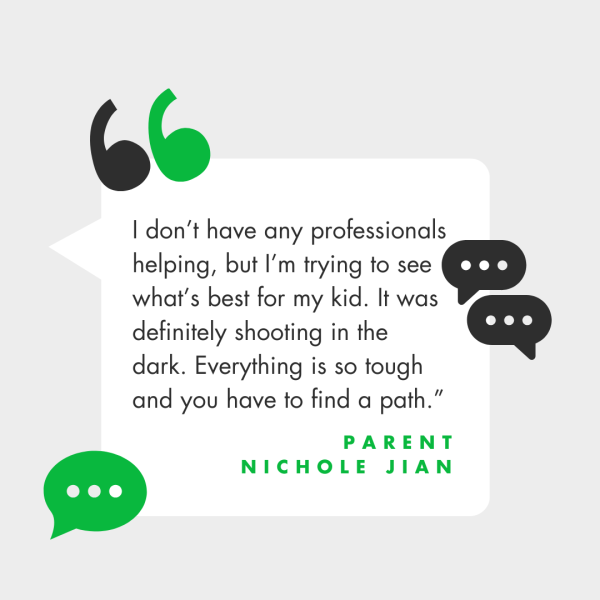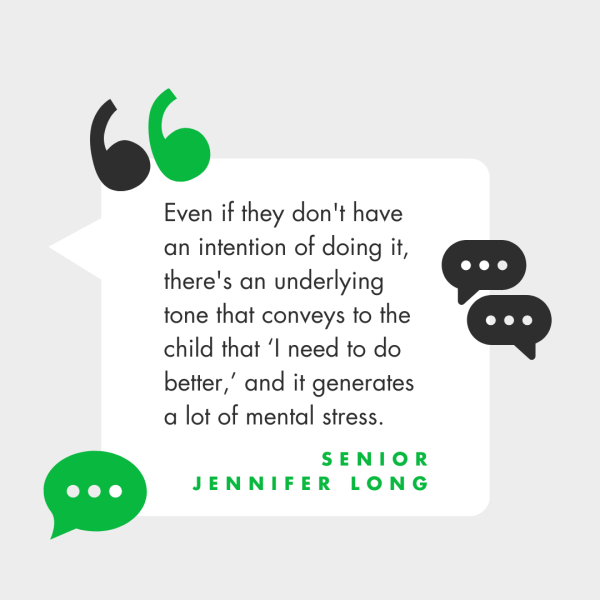Parent chats and networks, from organized WeChat and WhatsApp groups to parents simply talking to fellow parents online, are a common part of MVHS’s student culture. Senior Jennifer Long recalls her parents sharing information and advice that they learned from other parents through the chats almost daily. She notes that parents tend to share information about classes, college applications, various school or extracurricular teachers, school news and more. According to Long, she is very open to accepting that advice, having used it to guide her planning for college.
“My parents share about tutoring and classes, teachers, schools, application processes, everything I need to know to be college ready,” Long said.
As someone who often views advice from these networks, parent Nichole Jian also finds that these parent communities can prove extremely useful, especially because parents don’t always know how to approach helping their children or have access to specialized resources like private counselors.
“I definitely made a lot of mistakes. I don’t have any professionals helping, but I’m trying to see what’s best for my kid,” Jian said. “It was definitely shooting in the dark. Everything is so tough and you have to find a path.
According to Jian, parent communities were a huge resource for her when it came to finding advice, extracurriculars and alternatives to common high school pathways. They also helped her find counselors and teachers, and she would often share class recommendations or essay-writing tips with her daughter when her daughter was younger. Her usage of the information waned as her children grew older and began to find their own path, but at the start of high school, it provided a comforting baseline idea of how to approach school.
Guidance Counselor Clay Stiver also notes that many families in the MVHS community are immigrant families who don’t necessarily have experience with the American schooling system. Both Stiver and Jian notice that the process of college applications can be stressful to students and parents because of the unfamiliarity, and having a source of advice and information reduces that worry. However, Stiver observes that much of this information can be inaccurate when it comes to specific high school or college requirements or career opportunities. He cites the false ideas that volunteer hours are required for graduation or that non-STEM students will have extreme difficulty finding future success as examples of the pitfalls of parent networks.
“I think there’s a lot of value in getting feedback from other parents and stuff,” Stiver said. “But I have to dispel a lot of rumors. Maybe that’s feedback for us that we need to reach out to the parent community more, but more than half the time it’s incorrect information or not the whole story.”
 Long also points out that these chats and forums can foster toxicity when parents share personal information about their kids, such as what colleges they’re accepted into or what achievements they’ve earned. She recalls seeing parents asking for help, such as tutoring that inadvertently exposed students’ struggles to others, and personally feeling pressure to match up to her parents’ expectations compared to other students.
Long also points out that these chats and forums can foster toxicity when parents share personal information about their kids, such as what colleges they’re accepted into or what achievements they’ve earned. She recalls seeing parents asking for help, such as tutoring that inadvertently exposed students’ struggles to others, and personally feeling pressure to match up to her parents’ expectations compared to other students.
“Even if they don’t have an intention of doing it, there’s an underlying tone that conveys to the child that ‘I need to do better,’ and it generates a lot of mental stress,” Long said.
Stiver also notes that with the anxiety and stress sharing information causes, students might face expectations that aren’t always real requirements or even important to colleges, such as the aforementioned volunteer hours or taking unnecessarily difficult classes. He points out that much of the information is based on personal experiences and that each student has individualized needs.
“It’s not hurtful information, it’s all just very opinion-related,” Stiver said. “Like, saying ‘This course is really hard or easy,’ that just depends on who the student is, right? Everyone’s going to have a different experience.”
Jian agrees, pointing out from her experience that only some of the information and advice she found worked for who her children were and what they wanted out of their high school experience. However, Long and Jian both emphasize that having a parent community is still a resource that has helped them navigate school as a student and parent, coming from a place of positivity and camaraderie.
“From the students and parents, they’re helping the younger ones, and they have this culture every year,” Jian said. “I really appreciate that they share this so generously and help other kids.”









